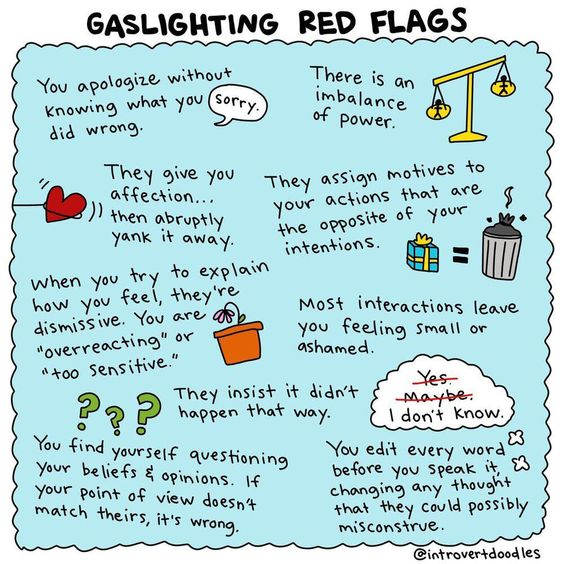What is Gaslighting & Steps to Take if You’re Being Gaslighted

Have you ever been in a situation where another person made you feel like your thoughts, feelings, and perspectives were invalid? They may make you wonder if you're the source of relational issues, and that you need to be more critical about how you think and feel. With them, your feelings are never acknowledged or justified, but rather they are used as an argument against you. Somehow, they always seem to end up right.
This is called gaslighting.
The term "gaslighting" became a large part of our conversations last year, enough for it to be crowned Merriam-Websters’ word of the year for 2022, and for good reason - it’s a very common form of emotional abuse within relationships.
According to Merriam-Webster, gaslighting is defined as:
- The psychological manipulation of a person, usually over an extended period of time that causes the victim to question the validity of their own thoughts, perception of reality, or memories and typically leads to confusion, loss of confidence and self-esteem, the uncertainty of one's emotional or mental stability, and a dependency on the perpetrator;
- The act or practice of grossly misleading someone, especially for one's own advantage
Essentially, gaslighting is a communication tactic that makes someone feel like their thoughts and feelings are incorrect. Whenever an issue or problem arises, the person being gaslit is always painted as the one in the wrong, mainly for their perception and way of thinking. Their sense of reality gets twisted as the perpetrator tries to control the situation and take advantage of the other.
Do you recognize any of these phrases and scenarios?
1. "You're Too Sensitive"
Mother Claire and daughter Paige are having a heated argument. They've been running into many problems recently. Paige has expressed that she feels hurt and disappointed by her mom's words and that her words are too critical of her and what she has to say. Paige doesn't feel like her thoughts and feelings are accepted, even though they are very reasonable. Claire tells her that she never criticizes her harshly and that she's always open to hearing what Paige has to say, even though she isn't. Claire tells Paige she's too sensitive to feel the way she does and to suck it up. According to Claire, Paige should be accepting of her feedback as her mother and that she has no reason to think it's critical or feel the way she does. She then reminds her of all she's done to provide for and raise her, and that it should be normal and acceptable for her to give feedback to Paige, so Paige's feelings of being harshly criticized are dismissed and minimized.
In this scenario, Paige is put down when she expresses her hurt and disappointment. Her mom's statement is an example of gaslighting because Paige's emotions are invalidated and manipulated to Claire's experience. Claire makes it seem like Paige is making a big deal out of nothing. Paige continues to feel disappointed and hurt, and now possibly confused and foolish for speaking up or feeling the way she does.
2. "I'm Sorry You Think I Hurt You"
Couple Paige and Brian are in a long-term relationship. Paige is crying to Brian about her mom, Claire, and how she feels hurt, unaccepted, and misunderstood by her. Instead of supporting and listening to Paige, Brian is preoccupied with his game. He makes comments that all his buddies are online, and he's been looking forward to playing all day. He also says: "You should know not to interrupt my game time with your feelings. My game is more important." Paige gets even more upset with Brian, yells at him, and shuts herself in the room.
Brian comes into the room after finishing his game and tells her: "I'm sorry you think I hurt you, but you should know that this time with my boys is important to me, and they were all online, so I couldn't wait. You should be more understanding and manage your own feelings until I'm done."
In this scenario, Brian gaslights Paige by making her believe that she overreacted. Brian makes it seem like she should have been more understanding, as he had no choice since all his buddies were online. While this statement seems like an apology, he deflects his responsibility as a partner and attempts to make Paige out as the "bad guy." This leaves Paige feeling further misunderstood and dismissed, as Brian invalidates her painful feelings and also does not ask further about the reason behind her being upset and yelling.
3. "You Know I'd Never Intentionally Hurt You"
Brian continues the conversation and tells Paige: "You know that I love you and would never intentionally hurt you. I just promised the boys that I would be online today, and they were all expecting me. I already told you about this plan - you should know."
By trying to make his intentions seem pure, Brian again deflects any responsibility and doesn't make space for Paige to share her feelings. When he says, "You should know," he sets her up to question whether she has a right to be upset and if her emotions are even acceptable to feel.
More often than not, gaslighting is an intentional strategy used to gain the upper hand in the conversation and relationship. Not only does this create a power imbalance in the relationship, but as the definition states, it can erode one's loss of self-confidence and self-esteem over time and cause mental and emotional issues to the victim.
Unfortunately, many of us have experienced gaslighting in the past. You might realize that this is the cause of your dysfunctional relationship. If this is the case, what can you do?

Here are some steps that you can follow.
1. Recognize and ensure that you are being gaslit
True gaslighting is a repeated pattern of manipulation. Gaslighting often leads you to:
- Doubt and question yourself
- Wonder constantly whether you’re too sensitive
- Apologize frequently
- Have difficulty with decision making
- Feel generally unhappy, confused, and not like your usual self
- Avoid loved ones since you don’t how to explain what’s going on
Remember that not all statements are considered gaslighting. Sometimes people may think they’re right, or have a different opinion from you. To know if it’s gaslighting, try to see if how they’re acting with you is a repeated pattern of behavior.
2. Take some space to gather your thoughts and refocus
Being gaslit means that you are in a situation where you’re being manipulated, and it can be tough to break free from that dynamic. It’s important that you take the time and space to refocus on yourself and find confidence in your thoughts and feelings again. Instead of trying to argue and reason with the perpetrator, physically remove yourself from the situation and ground yourself. You can try these grounding exercises:
- Breathing exercises
- Following a meditation
- Yoga
- Stretching
3. Write & Reflect on Your Experiences
Victims often stay in a cycle of gaslighting because it’s difficult to bring up concrete examples and points about the perpetrator. Documenting your interactions with the person that’s gaslighting you can help you keep track of what’s really happening from your perspective and validate your experience.
Write down your thoughts, feelings, and view of the situation, and how the other person made you feel. Try to reflect on what they specifically did to make you feel this way, and work towards building self-awareness and understanding as to why their treatment towards you is unacceptable. This process will help you feel more confident in your version of events and practice detaching their perspective from your own.
Aim to honor and validate your own feelings and version of events. The important thing is to give yourself a safe space to review your feelings honestly without the influence of others.
4. Speak Up & Remain Confident
Calling the other person out in a calm and assertive manner can show them that you are aware of what is happening and that you won’t stand for this behavior.
This may cause backlash from them as they try to protect themselves. Remaining confident in your version of events can help you get through to them, or at the very least give them more incentive to leave you alone.
5. Seek Help
Getting support from your peers, friends, and family you trust can give you more perspective on the situation. They may help reinforce your thoughts and feelings or redirect you through their observations. Speaking with someone you trust can also help you remain calm and grow confidence in yourself.
The emotional abuse that gaslighting causes is often difficult to confront and can become a very serious issue. If this is the case, seeking a professional therapist or taking therapy group courses can be a great source of support.
exclusively written for familycentre.org
by Jessica Tran
Effective Communication Skills
